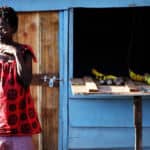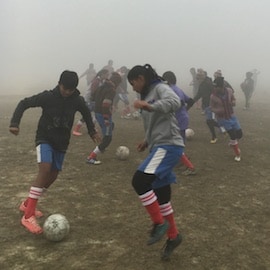Changing Mindsets to Empower Women: Roshaneh Zafar, On How Kashf Foundation Helped Microfinance Take Root in Pakistan
“It’s not the delivery of financial services that’s going to be your challenge. It’s really going to be about mindset change.”
That was the advice (or perhaps more accurately, the warning) that Muhammad Yunus delivered to Roshaneh Zafar when she first began considering launching a microfinance institution in Pakistan. When she spoke to other people about her plans, many were downright skeptical: “At one level it was doubting that this particular methodology would be relevant to Pakistan,” Zafar recalls. “But at the other level, it was ‘Oh, if you give people money, they’re never going to return it, because this is simply not the norm – this is not something that happens in Pakistan.'”
But despite these doubts, she forged ahead, founding Kashf Foundation in 1996 as the first specialized microfinance institution in Pakistan, with the goal of replicating the approach Yunus had pioneered with Grameen Bank. Once the institution started, it quickly proved the early naysayers wrong: “Our survey showed us that 86% of low-income women [customers] were involved in some kind of economic enterprises within their families,” Zafar says. “And 99% of the women we initially provided funds to repaid on time.”
Kashf Foundation has gone on to become one of the most recognized and respected institutions in the global sector, carving out a distinct niche for itself as a specialist in innovative and transformative approaches geared toward female customers. But its work hasn’t been easy – and according to Zafar, Yunus’ warning held true.
“Once we approached women to take money and start businesses, the first thing they said was, ‘I can’t actually do this. This is not something I have the confidence, the ability, or the belief to do,'” she recalls. “So one of the first naysayers in all of this were women entrepreneurs themselves. The fact that they would take money to earn money was something new to them. So I think the first challenge was really navigating that particular mindset: giving women affirmation, creating associative strength, acknowledging their role within their families. And that continues to be a challenge to this day.”
Kashf has faced many other barriers – some common to all microfinance providers working in emerging markets, others unique to Pakistan – and some caused by the particular cultural expectations facing women in the country. As Zafar explains, many women in Pakistan lack access to everything from the networks and contacts required to run a business, to basic transportation and mobility. What’s more, women are the caregivers in their families, facing the “triple burden” of running the household, taking care of children, and caring for relatives when they get sick. And many people in their families and broader communities don’t view women as worthy of making financial decisions in the first place.
However, as Kashf’s clients begin to gain traction in their businesses, these dynamics change. “Once [a female entrepreneur] starts making meaningful money, the pendulum begins to swing in her favor,” Zafar says. “We do see, in families we’ve been working with for four to five years, that men respect their wives more, and women are being included in financial decision-making. … In many cases, when women become successful entrepreneurs, it’s the men in the family who become employed by them.”
Check out the video below, recorded at the 2019 European Microfinance Week, in which Zafar discusses how Kashf Foundation handles the challenges of serving women customers in Pakistan, why its services go far beyond microcredit – and where the development sector’s investments in women are still falling short.
James Militzer is an editor at NextBillion.
- Categories
- Finance



